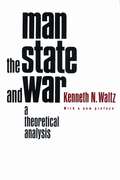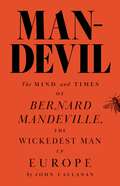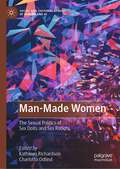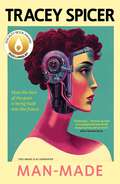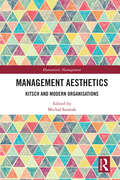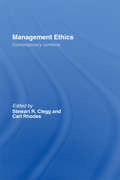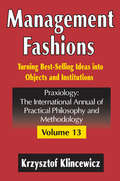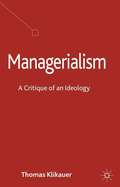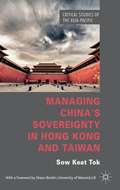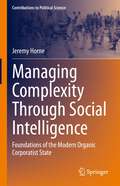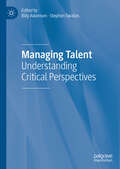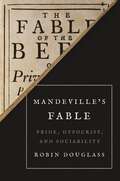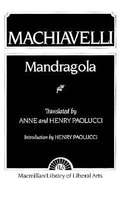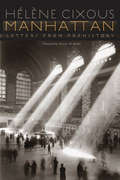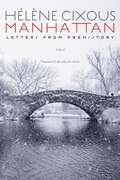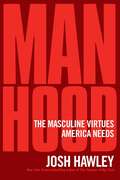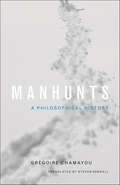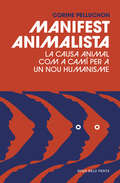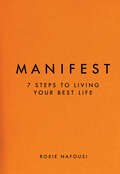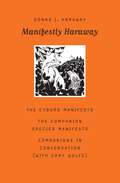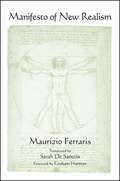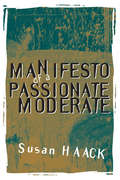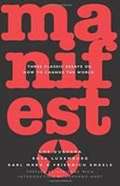- Table View
- List View
Man, the State, and War: A Theoretical Analysis
by Kenneth WaltzWhat are the causes of war? To answer this question, Professor Waltz examines the ideas of major thinkers throughout the history of Western civilization. He explores works both by classic political philosophers, such as St. Augustine, Hobbes, Kant, and Rousseau, and by modern psychologists and anthropologists to discover ideas intended to explain war among states and related prescriptions for peace.
Man-Devil: The Mind and Times of Bernard Mandeville, the Wickedest Man in Europe
by John J. CallananA lively and provocative account of Bernard Mandeville and the work that scandalized and appalled his contemporaries—and made him one of the most influential thinkers of the eighteenth centuryIn 1714, doctor, philosopher and writer Bernard Mandeville published The Fable of the Bees, a humorous tale in which a prosperous hive full of greedy and licentious bees trade their vices for virtues and immediately fall into economic and societal collapse. Outrage among the reading public followed; philosophers took up their pens to refute what they saw as the fable&’s central assertion. How could it be that an immoral community thrived but the introduction of morality caused it to crash and burn? In Man-Devil, John Callanan examines Mandeville and his famous fable, showing how its contentious claim—that vice was essential to the economic flourishing of any society—formed part of Mandeville&’s overall theory of human nature. Mandeville, Callanan argues, was perfectly suited to analyze and satirize the emerging phenomenon of modern society—and reveal the gap between its self-image and its reality.Callanan shows that Mandeville&’s thinking was informed by his medical training and his innovative approach to the treatment of illness with both physiological and psychological components. Through incisive and controversial analyses of sexual mores, gender inequality, economic structures, and political ideology, Mandeville sought to provide a naturalistic account of human behavior—one that put humans in close continuity with animals. Aware that his fellow human beings might find this offensive, he cloaked his theories in fables, poems, anecdotes, and humorous stories. Mandeville mastered irony precisely for the purpose of making us aware of uncomfortable aspects of our deepest natures—aspects that we still struggle to acknowledge today.
Man-Made Women: The Sexual Politics of Sex Dolls and Sex Robots (Social and Cultural Studies of Robots and AI)
by Kathleen Richardson Charlotta OdlindThis book presents a unique, feminist approach to ‘sex’ dolls and ‘sex’ robots, taking a critical look at the academic and business narratives that serve to rationalise them. As new forms of pornography (porn robots), this edited volume provides an urgent women’s centred critique. The emergence of ‘sex’ robots is situated within the wider context of the attack on women’s rights and the relentless rise of techno-pornography. As an outgrowth of the industries of prostitution, pornography and child sex abuse, these objects offer new ways to dehumanise women and girls. While support for ‘sex’ robots is positioned as progressive and emancipatory, the contributors in this volume argue they reduce women to consumable parts. They explore how law, the arts, ethics, economy, politics and culture are interconnected with harmful technological developments.
Man-Made: How the bias of the past is being built into the future
by Tracey SpicerWalkley Award-winning journalist Tracey Spicer exposes the next frontier of feminism. Man-Made aims to open readers&’ eyes to a transformative technological shift in society and give them the tools to make positive change. `Mum, I want a robot slave.&’ Broadcaster Tracey Spicer had an epiphany when her young son uttered these six words. Suddenly, her life&’s work fighting inequality seemed futile. What&’s the point in agitating to change the present, if bigotry is being embedded into our futures? And so began a quest to uncover who was responsible and hold them to account. Who is the ultimate villain? Big Tech, whose titans refuse to spend money to fix the problem? The world&’s politicians, who lack the will to legislate? Or should we all be walking into a hall of mirrors and taking a good, hard look at ourselves…? This is a deeply researched, illuminating and gripping ride into an uncertain future, culminating in a resounding call to action that will shake the tech sector to its foundations.Praise for Man-Made &‘Exhilarating … The book we need as we grapple with how AI will change our lives and our world.&’ Dame Quentin Bryce &‘Brilliant, hilarious and terrifying. You&’ll never see Alexa the same way again.&’ Juanita Phillips &‘Tracey Spicer uses her unmistakably human voice to warn us all about the deeply sexist Frankenstein&’s Monster that is modern AI.&’ Yumi Stynes
Management Aesthetics: Kitsch and Modern Organisations (Humanistic Management)
by Michał SzostakThis edited collection presents the complex theory of kitsch from aesthetic and artistic points of view, transposed into managerial and organisational fields. In the spirit of management aesthetics, on the ground of humanistic management, the central aim of the volume is to show that kitsch is a common phenomenon not only in art and culture but also in management, and its conscious perception and mindful use may be beneficial for achieving organisational and managerial goals efficiently. Due to the diverse research problems covered by particular chapters, no unified methodology is applied in the book; every author applied an optimal method for the selected topic. However, due to the complex and metaphysical character of the kitsch phenomenon, the only common fundament of all chapters is using the kitsch experience theory (Szostak and Sułkowski, 2020). The dominant analytical approach is qualitative, with extensive use of case studies, comparative analyses, and ethnographic focus. Despite this, some chapters also include the application of the quantitative approach for the hypotheses’ verification. This book makes a giant step ahead of its competitors by implementing the kitsch theory, especially the kitsch experience theory in a broad spectrum of managerial and organisational fields like marketing, advertising, brand management, business communication, entrepreneurship, leadership, decision-making, human resource management, corporate social responsibility, city space management, management of technology and innovation, and organisational culture. It should be a must-read for researchers, academics, practitioners, and advanced students in these fields.
Management Ethics: Contemporary Contexts (Routledge Companions In Business, Management And Accounting Ser.)
by Stewart R. Clegg Carl RhodesEthics has become big business but have businesses become ethical? This is a central question for today’s managers. Managing ethics is critical in an era characterized by unprecedented corporate power and a myriad of competing ethical traditions. Giving new insights into the understanding of ethics for today’s organization practice and managerial behaviour, this timely volume, edited by well-respected industry authorities, provides an overview and critique of ethics as they relate to contemporary challenges and issues (such as globalization, sustainability, consumerism, neo-liberalism, corporate collapses, leadership and corporate regulation). This book, an essential read for postgraduate students of business and ethics, is organized around the core question: What are the ethics of organizing in today’s institutional environment and what does this mean for the practice of management and the organization of business? In response to this, the contributors examine ethics as it is deeply embedded in the everyday practice of management. Interdisciplinary contributions from the fields of sociology, philosophy, management, organization studies and public administration provide unique perspectives, while case studies and real-life examples illustrate the challenges and dilemmas faced in practice. Each chapter has a brief overview and editor’s introduction which skilfully summarizes key points and draws connections between the chapters.
Management Fashions: Turning Bestselling Ideas into Objects and Institutions (Praxiology: The International Annual Of Practical Philosophy And Methodology Ser.)
by Krzysztof KlincewiczUsing the theory of management fashions proposed in the 1990s by Eric Abrahamson, Krzysztof Klincewicz analyzes the changing popularity of management concepts accompanied by solutions. Among these are management bestsellers, consulting services, software systems, methodologies, and approaches to organizational change, training courses, professional certifications and even new corporate positions.The book presents the phenomena of management fashions as being the key driver for the development of the management knowledge industry, consisting of consulting companies, computer firms, publishing houses, professional institutes, and other organizations involved in the launching and the promotion of new management techniques. The author supplements the existing body of knowledge by focusing on the supply-side of management fashions, particularly the strategies and marketing techniques of solution vendors, and proposes a model of relations between management ideas and tangible solutions, explaining how bestselling ideas are turned into objects and institutions.The empirical research described in this volume involves multiple methods, including discourse volume analysis and qualitative historical techniques. Included also is a comprehensive overview of the recent relevant developments in sociology, marketing, and organization sciences, in which the author draws on the heritage of praxiology by taking a meta-level perspective on the propositions of management science.
Management Ideas: A Short History of Business Administration (Contributions to Management Science)
by Klaus BrockhoffThis book offers a short history of business administration in four parts. Part 1 takes the reader from 8000 BCE with the development of simple control techniques to the middle of the nineteenth century. At this time, normative, empirical, and theoretical approaches to business problems in the industrial area were developed. Furthermore, more powerful methodologies came into use. In Part 2, the criteria for science are discussed and related to the development of business administration as a science at the beginning of the twentieth century. Part 3 demonstrates, using Germany as an example, the development of business administration as strongly influenced by its societal environment. The cases of National Socialist Germany, the socialist environment of the German Democratic Republic, and the reconstruction of an academic-inspired business administration in Western Germany are provided as illustrative examples. Part 3 also presents a typology of major specializations in business administration, examples of their development, and a proposal for a curricular approach to the discipline. The fourth and final part presents the benefits of studying the history of management ideas. This book is useful for academics in business administration, advanced students, and anyone who seeks to understand recent developments in business administration.
Managerialism
by Thomas KlikauerMost people know what management is but often people have vague ideas about Manageralism. This book introduces Manageralism and its ideology as a colonising project that has infiltrated nearly every eventuality of human society.
Managing China's Sovereignty in Hong Kong and Taiwan
by Sow Keat TokIs China always defensive about its sovereignty issues? Does China see sovereignty essentially as 'absolute,' 'Victorian,' or 'Westphalian?' Sow Keat Tok suggests that Beijing has a more nuanced and flexible policy towards 'sovereignty' than previously assumed. By comparing China's changing policy towards Taiwan and Hong Kong, the author relates the role of previous conceptions of the world order in China's conception of modern 'sovereignty', thereby uncovers Beijing's deepest concern when dealing with its sovereignty issues.
Managing Complexity Through Social Intelligence: Foundations of the Modern Organic Corporatist State (Contributions to Political Science)
by Jeremy HorneThis book presents solutions to problems that are total and based on thinking about how and why humans have organized themselves. It discusses how to avoid the now well-documented Holocene Extinction, propelled by climate change, wars, resource depletion, desertification, degrading knowledge quality, famine, and deterioration of societies overall. It explains why we cannot respond effectively with hedonistic, incompetent, corrupt, and anarchistic "liberal democracy" and why neither personality cult regimes can suffice. The book offers a model of an organic social structure embodying a collective consciousness of communitarianism and Platonic-style ethos. Putting an emphasis on the re-establishment of Classical Greek virtue, it offers solutions to resolve identity politics, alienation, and meritocracy. While doing so, the author opposes the "everyone is equal" ideology to govern the section of policymakers, instead circumscribing "rights" in terms of responsibilities, prioritizing education and training to carry forth the ethos of valuing truth above materialism, and developing Durkheim's social brain via a new discipline, "sociointelligence". The book goes on to explain how underpinning these elements is a comprehensive elucidation of often misunderstood words like "liberty", "freedom", "authoritarianism", and "democracy". All of these areas are arranged and combined in uniquely describing the organic society the author deems necessary to avoid human extinction. As a result, the book presents a “new organicity”, where the emerging transhumanism seeks to transcend hydrocarbon-based life with humanly-constructed life.This book will appeal to students, researchers, and scholars of political science, philosophy, and the social sciences interested in a better understanding of complexity, democratic theory, Holocene Extinction, organic thinking, and meritocratic societies.
Managing Talent: Understanding Critical Perspectives
by Billy Adamsen Stephen SwailesThis edited collection offers a critical appreciation of talent management in contrast to the extensive literature adopting mainstream approaches to the topic. The authors explore fundamental questions in the field to better understand why managing talent seems so attractive as a management practice, the meaning of talent, and how talent is recognised in organisations. The mix of conceptual and empirical chapters in the book teases out some critical perspectives that will provoke thought and reflection among practitioners and stimulate ideas for new research topics and approaches. The diverse contributions presented in this book will undoubtedly be of use to academics, practitioners and postgraduate students of human resource management.
Managing Your Academic Research Project
by Jacqui Ewart Kate AmesThis book is an essential resource for academics managing a large and complex research project. It provides important practical insights into the processes that inform such research projects and delivers insights into the delicate balance between industry, stakeholder and academic needs. It gives practical advice about developing relationships with diverse partners and colleagues and managing the expectations of the various parties involved and on avoiding pitfalls. This book uses examples from Australian research projects, but it contains insights relevant to researchers all around the world.
Mandeville’s Fable: Pride, Hypocrisy, and Sociability
by Dr Robin DouglassWhy we should take Bernard Mandeville seriously as a philosopherBernard Mandeville&’s The Fable of the Bees outraged its eighteenth-century audience by proclaiming that private vices lead to public prosperity. Today the work is best known as an early iteration of laissez-faire capitalism. In this book, Robin Douglass looks beyond the notoriety of Mandeville&’s great work to reclaim its status as one of the most incisive philosophical studies of human nature and the origin of society in the Enlightenment era. Focusing on Mandeville&’s moral, social, and political ideas, Douglass offers a revelatory account of why we should take Mandeville seriously as a philosopher.Douglass expertly reconstructs Mandeville&’s theory of how self-centred individuals, who care for their reputation and social standing above all else, could live peacefully together in large societies. Pride and shame are the principal motives of human behaviour, on this account, with a large dose of hypocrisy and self-deception lying behind our moral practices. In his analysis, Douglass attends closely to the changes between different editions of the Fable; considers Mandeville&’s arguments in light of objections and rival accounts from other eighteenth-century philosophers, including Shaftesbury, Hume, and Smith; and draws on more recent findings from social psychology.With this detailed and original reassessment of Mandeville&’s philosophy, Douglass shows how The Fable of the Bees—by shining a light on the dark side of human nature—has the power to unsettle readers even today.
Mandragola
by Niccolo Machiavelli Anne Paolucci Henry PaolucciWritten somewhere between 1512 and 1520, this is a comedic play in which a love stuck young man tries to win the affections of the young, beautiful wife of an old doctor.
Manhattan: Letters from Prehistory
by Hélène Cixous Beverley Bie BrahicManhattan is the tale of a young French scholar who travels to the United States in 1965 on a Fulbright Fellowship to consult the manuscripts of beloved authors. In Yale University’s Beinecke Library, tantalized by the conversational and epistolary brilliance of a fellow researcher, she is lured into a picaresque and tragic adventure. Meanwhile, back in France, her children and no-nonsense mother await her return. A young European intellectual’s first contact with America and the city of New York are the background of this story. The experience of Manhattan haunts this labyrinth of a book as, over a period of thirty-five years, its narrator visits and revisits Central Park and a half-buried squirrel, the Statue of Liberty and a never again to be found hotel in the vicinity of Morningside Heights: a journey into memory in which everything is never the same. Traveling from library to library, France to the United States, Shakespeare to Kafka to Joyce, Manhattan deploys with gusto all the techniques for which Cixous’s fiction and essays are known: rapid juxtapositions of time and place, narrative and description, analysis and philosophical reflection. It investigates subjects Cixous has spent her life probing: reading, writing, and the “omnipotence-other” seductions of literature; a family’s flight from Nazi Germany and postcolonial Algeria; childhood, motherhood, and, not least, the strange experience of falling in love with, as Jacques Derrida writes, “a counterfeit genius.”
Manhattan: Letters from Prehistory
by Hélène CixousManhattan is the tale of a young French scholar who travels to the United States in 1965 on a Fulbright Fellowship to consult the manuscripts of beloved authors. In Yale University’s Beinecke Library, tantalized by the conversational and epistolary brilliance of a fellow researcher, she is lured into a picaresque and tragic adventure. Meanwhile, back in France, her children and no-nonsense mother await her return. A young European intellectual’s first contact with America and the city of New York are the background of this story. The experience of Manhattan haunts this labyrinth of a book as, over a period of thirty-five years, its narrator visits and revisits Central Park and a half-buried squirrel, the Statue of Liberty and a never again to be found hotel in the vicinity of Morningside Heights: a journey into memory in which everything is never the same. Traveling from library to library, France to the United States, Shakespeare to Kafka to Joyce, Manhattan deploys with gusto all the techniques for which Cixous’s fiction and essays are known: rapid juxtapositions of time and place, narrative and description, analysis and philosophical reflection. It investigates subjects Cixous has spent her life probing: reading, writing, and the “omnipotence-other” seductions of literature; a family’s flight from Nazi Germany and postcolonial Algeria; childhood, motherhood, and, not least, the strange experience of falling in love with a counterfeit genius.
Manhood: The Masculine Virtues America Needs
by Josh HawleyNationally best-selling author (The Tyranny of Big Tech), constitutional lawyer, and U.S. senator for the state of Missouri argues that the character of men and the male virtue that goes along with it is a necessary ingredient to a functioning society and a healthy, free republic.A free society that despises manhood will not remain free. The American Founders believed that a republic depends on certain masculine virtues. Senator Josh Hawley thinks they were right. In a bold new book, he calls on American men to stand up and embrace their God-given responsibility as husbands, fathers, and citizens. No republic has ever survived without men of character to defend what is just and true. Starting with the wisdom of the ancients, from the Greek and Roman philosophers to Jesus of Nazareth, and drawing on the lessons of American history, Hawley identifies the defining strengths of men, including responsibility, bravery, fidelity, and leadership. As Theodore Roosevelt declared, the &“very existence of the state depends on the character of its citizens…. I am for business. But I am for manhood first.&” Hawley shows why the foolhardy assault on masculinity in education, the media, the workplace, and every level of government is an assault on freedom itself. Practical, down to earth, and urgent, Manhood: The Masculine Virtues America Needs is required reading for every American patriot.
Manhunts: A Philosophical History
by Grégoire ChamayouA comprehensive history of manhunting in the West, from ancient times to the presentTouching on issues of power, authority, and domination, Manhunts takes an in-depth look at the hunting of humans in the West, from ancient Sparta, through the Middle Ages, to the modern practices of chasing undocumented migrants. Incorporating historical events and philosophical reflection, Grégoire Chamayou examines the systematic and organized search for individuals and small groups on the run because they have defied authority, committed crimes, seemed dangerous simply for existing, or been categorized as subhuman or dispensable.Chamayou begins in ancient Greece, where young Spartans hunted and killed Helots (Sparta's serfs) as an initiation rite, and where Aristotle and other philosophers helped to justify raids to capture and enslave foreigners by creating the concept of natural slaves. He discusses the hunt for heretics in the Middle Ages; New World natives in the early modern period; vagrants, Jews, criminals, and runaway slaves in other eras; and illegal immigrants today. Exploring evolving ideas about the human and the subhuman, what we owe to enemies and people on the margins of society, and the supposed legitimacy of domination, Chamayou shows that the hunting of humans should not be treated ahistorically, and that manhunting has varied as widely in its justifications and aims as in its practices. He investigates the psychology of manhunting, noting that many people, from bounty hunters to Balzac, have written about the thrill of hunting when the prey is equally intelligent and cunning.An unconventional history on an unconventional subject, Manhunts is an in-depth consideration of the dynamics of an age-old form of violence.
Manifest animalista: La causa animal com a camí per a un nou humanisme
by Corine PelluchonLa violència contra els animals és un atac directe a la nostra humanitat. Això demostra Corine Pelluchon en aquest breu, pragmàtic, i controvertit assaig que suposa una contribució radical a l'ètica i la filosofia política. Lluitar contra el maltractament animal és rebel·lar-se contra una societat basada en l'explotació, i per això la causa animalista és una qüestió política major que ens concerneix a tots, més enllà d'ideologies o conflictes d'interessos. Amb un estil viu, persuasiu i inspirador, l'autora proposa un camí possible i factible per portar aquest debat a l'esfera política amb tanta claredat i urgència com sigui possible. Ressenyes:«Corine Pelluchon ho explica tot absolutament bé en tot just un centenar de pàgines: per ser una alternativa vàlida, és imprescindible polititzar la causa animal.»Luce Lapin, Charlie Hebdo «L'objectiu principal de l'autora està completament assolit en aquest Manifest animalista: dóna al lector les claus que li permetran ampliar el radi d'acció de l'humanisme als animals.»Philippe Douroux, Libération «Una perspectiva bella i ambiciosa.»Isabelle Gravillon, Femme Majuscule «Un llibre d'intervenció política, tan compromès com lúcid.»Robert Jules, La Tribune «Una de les moltes i grans qualitats d'aquest Manifest animalista és que, en tot moment, el seu projecte està exposat de manera perfectament creïble i realitzable. Precisament per això, l'autora no es fa cap il·lusió sobre la dificultat que suposa introduir la qüestió animal en el debat polític.»Hicham-Stéphane Afeissa, Non Fiction
Manifest: 7 Steps to Living Your Best Life
by Roxie NafousiTHE INSTANT INTERNATIONAL BESTSELLER Change your life with the first truly practical guide to manifesting, the hugely popular self-development practice that will transform your life for good . . . Written by self-development coach and 'Queen of Manifesting' Roxie Nafousi, this book is the essential guide to anyone and everyone wanting to feel more empowered in their lives. In just seven simple steps you can understand the true art of manifestation and create the life you have always dreamed of. Whether you want to attract your soulmate, land the perfect job, buy the home you have always wanted, or simply find more inner-peace and confidence, Manifest will teach you exactly how to get there . . . 1. Be clear in your vision2. Remove fear and doubt3. Align your behavior4. Overcome tests from the universe5. Embrace gratitude without caveats6. Turn envy into inspiration7. Trust in the universe A meeting of science and wisdom, manifesting is a philosophy and a self-development practice to help you reach for your goals, cultivate self-love and live your best life. Unlock the magic for yourself and begin your journey to turning your dreams into reality.
Manifestly Haraway (Posthumanities #37)
by Donna J. HarawayElectrifying, provocative, and controversial when first published thirty years ago, Donna Haraway&’s &“Cyborg Manifesto&” is even more relevant today, when the divisions that she so eloquently challenges—of human and machine but also of gender, class, race, ethnicity, sexuality, and location—are increasingly complex. The subsequent &“Companion Species Manifesto,&” which further questions the human–nonhuman disjunction, is no less urgently needed in our time of environmental crisis and profound polarization.Manifestly Haraway brings together these momentous manifestos to expose the continuity and ramifying force of Haraway&’s thought, whose significance emerges with engaging immediacy in a sustained conversation between the author and her long-term friend and colleague Cary Wolfe. Reading cyborgs and companion species through and with each other, Haraway and Wolfe join in a wide-ranging exchange on the history and meaning of the manifestos in the context of biopolitics, feminism, Marxism, human–nonhuman relationships, making kin, literary tropes, material semiotics, the negative way of knowing, secular Catholicism, and more.The conversation ends by revealing the early stages of Haraway&’s &“Chthulucene Manifesto,&” in tension with the teleologies of the doleful Anthropocene and the exterminationist Capitalocene. Deeply dedicated to a diverse and robust earthly flourishing, Manifestly Haraway promises to reignite needed discussion in and out of the academy about biologies, technologies, histories, and still possible futures.
Manifesto of New Realism (SUNY series in Contemporary Italian Philosophy)
by Maurizio FerrarisPhilosophical realism has taken a number of different forms, each applied to different topics and set against different forms of idealism and subjectivism. Maurizio Ferraris's Manifesto of New Realism takes aim at postmodernism and hermeneutics, arguing against their emphasis on reality as constructed and interpreted. While acknowledging the value of these criticisms of traditional, dogmatic realism, Ferraris insists that the insights of postmodernism have reached a dead end. Calling for the discipline to turn its focus back to truth and the external world, Ferraris's manifesto—which sparked lively debate in Italy and beyond—offers a wiser realism with social and political relevance.
Manifesto of a Passionate Moderate: Unfashionable Essays
by Susan HaackForthright and wryly humorous, philosopher Susan Haack deploys her penetrating analytic skills on some of the most highly charged cultural and social debates of recent years. Relativism, multiculturalism, feminism, affirmative action, pragmatisms old and new, science, literature, the future of the academy and of philosophy itself—all come under her keen scrutiny in Manifesto of a Passionate Moderate. "The virtue of Haack's book, and I mean virtue in the ethical sense, is that it embodies the attitude that it exalts. . . Haack's voice is urbane, sensible, passionate—the voice of philosophy that matters. How good to hear it again."—Jonathan Rauch, Reason "A tough mind, confident of its power, making an art of logic . . . a cool mastery."—Paul R. Gross, Wilson Quarterly "Few people are better able to defend the notion of truth, and in strong, clear prose, than Susan Haack . . . a philosopher of great distinction."—Hugh Lloyd-Jones, National Review "If you relish acute observation and straight talk, this is a book to read."—Key Reporter (Phi Beta Kappa) "Everywhere in this book there is the refreshing breeze of common sense, patiently but inexorably blowing."—Roger Kimball, Times Literary Supplement "A refreshing alternative to the extremism that characterizes so much rhetoric today."—Kirkus Reviews
Manifesto: Three Classic Essays on How to Change the World
by Friedrich Engels Karl Marx Ernesto Che Guevara Rosa Luxemburg"Let's be realists, let's dream the impossible." Che Guevara's words summarize the radical vision of the four famous rebels presented in this book: Marx and Engels' "Communist Manifesto," Rosa Luxemburg's "Reform or Revolution" and Che Guevara's "Socialism and Humanity." Far from being lifeless historical documents, these manifestos for revolution will resonate with a new generation also seeking a better world. "The world described by Marx and Engels... is recognizably the world we live in 150 years later.
